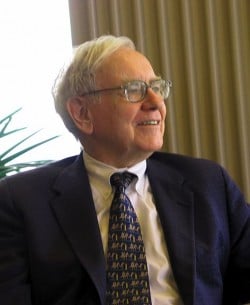Analyzing the Oracle: How optimistic is Warren Buffett feeling this year?

Photo courtesy of Wikimedia Commons; Mark Hirschey
One of our services is analyzing shareholder letters to help public companies improve their communications. So we are excited that Warren Buffett, CEO of Berkshire Hathaway, released his 50th annual shareholder letter this week. The BRK letters always represent best-practices when it comes to financial communications, so we decided to benchmark Mr. Buffett’s letter against his previous 49 annual letters as well as our database of thousands of shareholder letters to find out:
- Are there any insights hidden in his letter that language analytics can reveal?
- Is his language more or less optimistic about the market this year?
- Does his language portray confidence in the future of BRK?
And in a change of pace this year, Mr. Buffett’s vice chairman, Charlie Munger, also wrote a letter to shareholders in the annual report. How do the much-heralded words of the Oracle of Omaha compare to those of his second in command?
Our Analytics Approach
Using natural language processing and linguistic mapping tools, we analyzed Mr. Buffett’s and Mr. Munger’s 2014 shareholder letters. To provide context to the measurement, we benchmarked the 2014 language against Mr. Buffett’s previous 49 annual letters, indexed against our extensive database of thousands of public company shareholder letters.
Our Findings
- What changed the most between Mr. Buffett’s 2013 and 2014 letters?Mr. Buffett’s shareholder letters remain relatively consistent – however his language in 2014 is 13% more confident and 8% less optimistic. Confident language represents the degree to which the author appears to believe in his message. This may be regarding past events as well as future ones. Optimistic language is focused solely on the future.
- How does Mr. Munger’s language compare to the language of Mr. Buffett?The language of Mr. Munger is 29% more optimistic than the language of Mr. Buffett. However, Mr. Buffett uses language that is 74% more trustworthy and 45% more credible than the language used by Mr. Munger.
- Is Mr. Buffett writing for the future leaders of Berkshire Hathaway?This is a claim made by the Wall Street Journal in this article. Our data seems to support this assumption. Mr. Buffett uses the future tense 12% more often than he did in his 2013 letter to shareholders. Although his levels of optimistic language have decreased from last year, his language is still more optimistic than it has been in the majority of his previous letters to shareholders.
